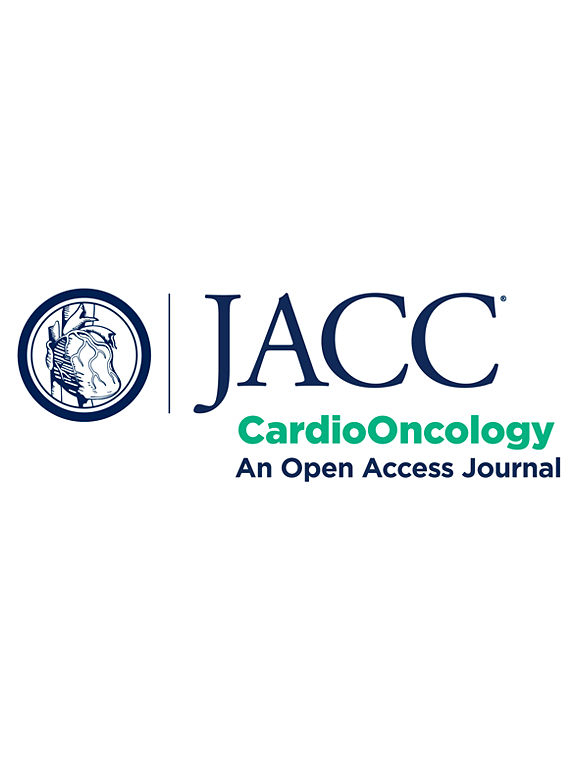Clonal Hematopoiesis and Risk of Heart Failure After Autologous Hematopoietic Cell Transplantation for Lymphoma
IF 12
1区 医学
Q1 CARDIAC & CARDIOVASCULAR SYSTEMS
引用次数: 0
Abstract
Background
Patients with lymphoma are at high risk for developing heart failure (HF) after autologous hematopoietic cell transplantation (HCT). More accurate risk determination pre-HCT may facilitate screening and prevention of HF.
Objectives
The aim of this study was to examine the association between clonal hematopoiesis of indeterminate potential (CHIP) and the risk for HF after HCT for lymphoma.
Methods
This was a retrospective cohort study of 861 patients who underwent autologous HCT for lymphoma between 2010 and 2016 at City of Hope Comprehensive Cancer Center. Targeted DNA sequencing was performed to determine the presence of CHIP (variant allele frequency ≥ 2%). The primary outcome of interest was the 5-year cumulative incidence of de novo HF. Other outcomes of interest included overall and cause-specific mortality.
Results
Overall, 186 patients (21.7% of the cohort) had at least 1 CHIP variant, and 59 (6.9%) had ≥2 variants. DNMT3A, PPM1D, and TET2 were the most frequently mutated genes. The 5-year incidence of HF was significantly higher in patients with CHIP compared with those without CHIP (13.8% vs 4.7%; P < 0.001; sub-distribution hazard ratio [sHR]: 2.48; 95% CI: 1.32-4.68); the HF incidence increased by variant allele frequency: 0-2% (4.7%), 2-10% (11.7%), and >10% (18.5%), P < 0.001. Patients with CHIP had significantly worse overall survival after HCT, compared with those without (63.4% vs 80.3%; P < 0.001), due primarily to the higher risk for nonrelapse mortality (subdistribution HR: 5.37; 95% CI: 2.34-12.35).
Conclusions
CHIP was highly prevalent and associated with risk for HF and nonrelapse mortality after HCT. These findings highlight the role of CHIP as a novel biomarker and potential target for intervention to improve outcomes after autologous HCT.
自体造血细胞移植治疗淋巴瘤后克隆造血和心力衰竭的风险。
背景:淋巴瘤患者在自体造血细胞移植(HCT)后发生心力衰竭(HF)的风险很高。hct前更准确的风险判断有助于筛查和预防心衰。目的:本研究的目的是研究不确定电位克隆造血(CHIP)与淋巴瘤HCT后HF风险之间的关系。方法:这是一项回顾性队列研究,纳入了2010年至2016年在希望之城综合癌症中心接受自体HCT治疗淋巴瘤的861例患者。进行靶向DNA测序以确定CHIP的存在(变异等位基因频率≥2%)。研究的主要终点是5年累计新发心衰发生率。其他值得关注的结果包括总死亡率和死因特异性死亡率。结果:总体而言,186名患者(占队列的21.7%)至少有1种CHIP变异,59名患者(6.9%)有≥2种变异。DNMT3A、PPM1D和TET2是最常见的突变基因。CHIP患者的5年HF发病率显著高于非CHIP患者(13.8% vs 4.7%;P < 0.001;亚分布风险比[sHR]: 2.48;95% ci: 1.32-4.68);HF发病率随变异等位基因频率的增加而增加:0 ~ 2%(4.7%)、2 ~ 10%(11.7%)、bb0 ~ 10% (18.5%), P < 0.001。与未接受HCT的患者相比,CHIP患者在HCT后的总生存率显著降低(63.4% vs 80.3%;P < 0.001),主要是由于非复发死亡率风险较高(亚分布HR: 5.37;95% ci: 2.34-12.35)。结论:CHIP非常普遍,并与HCT后HF和非复发死亡率的风险相关。这些发现强调了CHIP作为一种新的生物标志物和潜在的干预靶点的作用,以改善自体HCT后的预后。
本文章由计算机程序翻译,如有差异,请以英文原文为准。
求助全文
约1分钟内获得全文
求助全文
来源期刊

Jacc: Cardiooncology
Multiple-
CiteScore
12.50
自引率
6.30%
发文量
106
期刊介绍:
JACC: CardioOncology is a specialized journal that belongs to the esteemed Journal of the American College of Cardiology (JACC) family. Its purpose is to enhance cardiovascular care for cancer patients by publishing high-quality, innovative scientific research and sharing evidence-based knowledge.
The journal aims to revolutionize the field of cardio-oncology and actively involve and educate professionals in both cardiovascular and oncology fields. It covers a wide range of topics including pre-clinical, translational, and clinical research, as well as best practices in cardio-oncology. Key areas of focus include understanding disease mechanisms, utilizing in vitro and in vivo models, exploring novel and traditional therapeutics (across Phase I-IV trials), studying epidemiology, employing precision medicine, and investigating primary and secondary prevention.
Amyloidosis, cardiovascular risk factors, heart failure, and vascular disease are some examples of the disease states that are of particular interest to the journal. However, it welcomes research on other relevant conditions as well.
 求助内容:
求助内容: 应助结果提醒方式:
应助结果提醒方式:


